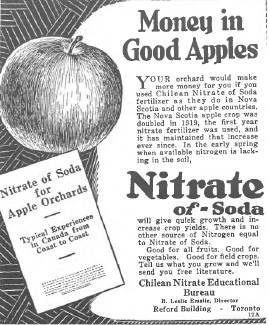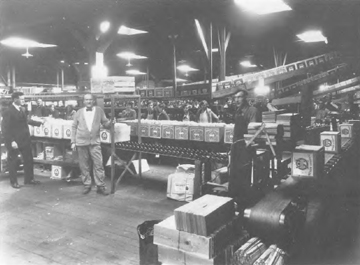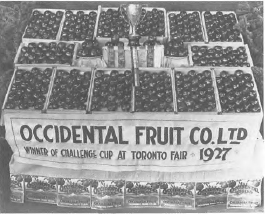News & Events More |
Under the Associated UmbrellaThe "leakage" of tonnage from the cooperative was speeded by a Supreme Court of Canada decision in January, 1926, against Associated Growers. To get out of his contract, a Winfield grower named Edmunds transferred his property to a company in which he and his wife were the chief shareholders. Associated Growers took him to court, but both the original decision and two appeals went against the cooperative. This set a precedent for other growers who wished to avoid honouring their contracts. The O.K. Bulletin, house organ of the cooperative, observed: The temptation to break away is, of course, constantly before all growers, knowing well that-just as long as the great majority hold together and protect the market-just so long can some little extra profits be made by refusing to share in the costs of protection-but what if enough break away to make the load too heavy for those who remain, or if those who remain refuse to "carry the umbrella" any longer?  In a nutshell, this was the dilemma of the Associated. The avowed aim of "stabilizing" the market put Associated Growers in a squeeze. By selling heavily on the less profitable export market, and by holding back from Prairie markets at the beginning of the selling season, it protected the market from being flooded. Thus it kept prices generally higher and more stable than if it had entered into competition on even terms with the independent shippers. This policy meant that returns to all growers were higher than they otherwise would have been. It also meant, however, that Associated Growers itself received less than its fair share of the most lucrative Prairie markets, and more than its share of the export trade expenses and of the cost of fruit storage for late season sales at lower prices. Therefore, while in absolute terms the whole industry benefited, growers selling through independent shippers often appeared to be getting better returns. They were sheltered under the "Associated umbrella" but were not putting up any part of the costs. This comparative advantage led many growers to leave the cooperative, and each defection hurt. These the supporters of cooperation and those of independent selling. This feud disrupted attempts to improve arrangements and prevented general agreement among the growers on any subject.  The actual figures needed to compare returns from the independent shippers with those from Associated Growers are not available, for while the Associated published its pool returns, few if any of the independents did. As the O.K. Bulletin never ceased to point out, the independent operators only publicized their figures for particular grades and varieties where their prices were highest, and didn't mention their failures. It may have been fair for Associated Growers to say that "if it were possible to get accurate figures showing proportions of each grade packed by each shipper, it would be found that the Associated averaged considerably more than the average independent shipper." But, justly or not, the information seen by the growers was the highest returns from the best independents. So there was a drifting away of growers, particularly those producing choice fruit and varieties most in demand, again leaving the less desirable product to the cooperative, which felt obliged to sell everything offered to it. This problem was noted by Dean F.M. Clement when he reported on the condition of Associated Growers in 1933: The tonnage, while good mainly, is also in part the dregs of a "save the industry" campaign. It is not a tonnage selected to meet the demands of the market. It is a tonnage the growers want sold.  Associated Growers realized that, with its declining portion of the crop, it was impossible to stabilize and control the market as envisioned when it was organized. Orderly marketing required concerted effort on the part of all shippers, something which proved very difficult to arrange. Attempts to get Associated Growers, Sales Service Ltd. (sales agent for most of the larger independents), and the other independent shippers together to set minimum prices and apportion markets failed because of the impossibility of punishing violations of any possible "gentleman's agreement". Cooperation, because of its voluntary nature, had failed the growers. Some outside force was needed to bring about orderly marketing. Contact Us Hours: 9am - 4pm weekdays. t: 250-762-5226 |

